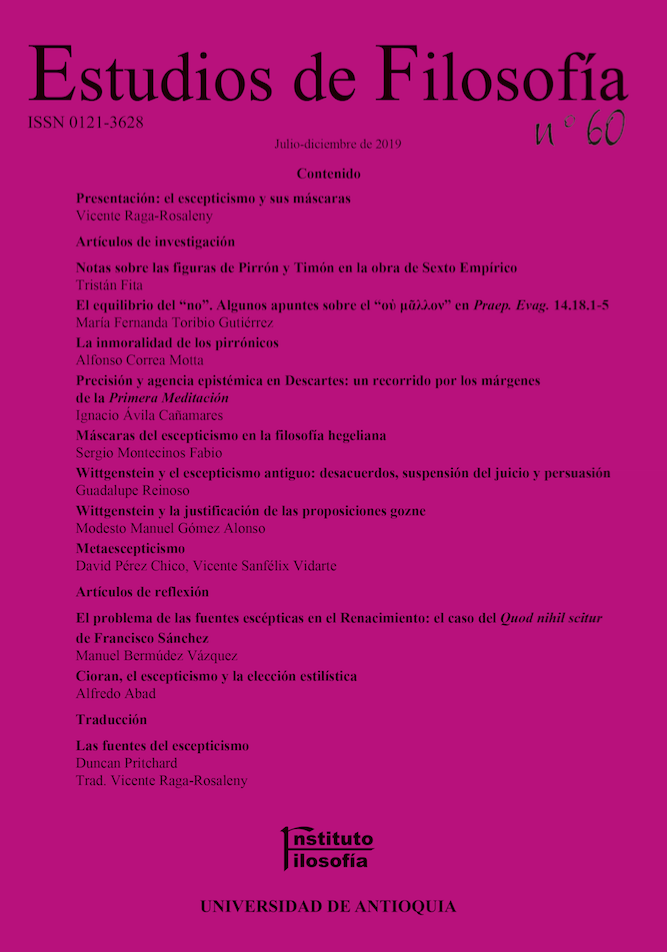Wittgenstein and the justification of hinge propositions
DOI:
https://doi.org/10.17533/10.17533/udea.ef.n60a08Keywords:
arbitrary assumption, constitutivism, hinge epistemology, meaning-scepticism, primacy of the practical, rational justification, WittgensteinAbstract
Questions about the possibility of thought as an activity directed to reality, are deeper than those concerning the possibility of knowledge. These deeper questions have found intuitive expression in the Agrippan Trilemma, particularly in the trope of arbitrary presupposition. This trope can be raised as a criticism of current varieties of hinge epistemology inspired by Wittgenstein, mainly by virtue of the fact that Wittgensteinian hinges are foundational principles governing our epistemic practice. As such, they are necessarily unsupportable, being thus dificult to see how it would be possible to conciliate the hinges’ lack of support with their being not bare, arbitrary assertions. Facing up to this challenge, hinge epistemologists have proposed practical —though not pragmatic— arguments according to which hinges are either postulates legitimately demanded to every epistemic agent or rules constitutive of quotidian practices. It is the aim of this article to show that practical arguments for hinges fall short, necessarily so.
Downloads
References
Barnes, J. (1990). The Toils of Scepticism. Cambridge, Cambridge University Press.
Coliva, A. (2015). Extended Rationality: A Hinge Epistemology. Basingstoke, Palgrave.
Cook, J. W. (1985). The Metaphysics of Wittgenstein’s On Certainty. Philosophical Investigations, 8(2), 81-119.
Cook, J. W. (1994). Wittgenstein’s Metaphysics. Cambridge, Cambridge University Press.
Fichte, J.G. (1988). Early Philosophical Writings. Ithaca & London, Cornell University Press.
Plato. (2014). Theaetetus. Oxford, Oxford University Press.
Pritchard, D. (2016). Epistemic Angst: Radical Scepticism and the Groundlessness of Our Believing. Princeton & Oxford, Princeton University Press.
Schmitz, B. (2006). Grammatical Propositions. En Michael Kober (Ed.), Deepening Our Understanding of Wittgenstein (pp. 227-49). Amsterdam & New York, Rodopi.
Sosa, E. (2011). Knowing Full Well. Princeton and Oxford: Princeton University Press.
Sosa, E. (2015). Judgment and Agency. Oxford, Oxford University Press.
Waismann, F. (1979). Wittgenstein and the Vienna Circle. Oxford, Blackwell.
Wittgenstein, L. (2004). On Certainty. Oxford, Blackwell.
Wright, C. (1991). Scepticism and Dreaming: Imploding the Demon. Mind, 100, (397), 87-116.
Wright, C. (2004). Wittgensteinian Certainties. En Dennis McManus (Ed.), Wittgenstein and Scepticism (pp. 22-55). London & New York, Routledge.
Wright, C. (2012). Replies Part IV: Warrant Transmission and Entitlement. En Annalisa Coliva (Ed.), Mind, Meaning, and Knowledge: Themes from the Philosophy of Crispin Wright (pp. 451-86). Oxford, Oxford University Press.
Published
How to Cite
Issue
Section
Categories
License
Copyright (c) 2019 Modesto Manuel Gómez Alonso

This work is licensed under a Creative Commons Attribution-NonCommercial-ShareAlike 4.0 International License.
Authors who publish with this journal agree to the following terms:
1. The Author retains copyright in the Work, where the term "Work" shall include all digital objects that may result in subsequent electronic publication or distribution.
2. Upon acceptance of the Work, the author shall grant to the Publisher the right of first publication of the Work.
3. The Author shall grant to the Publisher a nonexclusive perpetual right and license to publish, archive, and make accessible the Work in whole or in part in all forms of media now or hereafter known under a Creative Commons Attribution-NoCommercia-ShareAlike (CC BY-NC-SA 4.0), or its equivalent, which, for the avoidance of doubt, allows others to copy, distribute, and transmit the Work under the following conditions: (a) Attribution: Other users must attribute the Work in the manner specified by the author as indicated on the journal Web site;(b) Noncommercial: Other users (including Publisher) may not use this Work for commercial purposes;
4. The Author is able to enter into separate, additional contractual arrangements for the nonexclusive distribution of the journal's published version of the Work (e.g., post it to an institutional repository or publish it in a book), as long as there is provided in the document an acknowledgement of its initial publication in this journal;
5. Authors are permitted, and Estudios de Filosofía promotes, to post online the preprint manuscript of the Work in institutional repositories or on their Websites prior to and during the submission process, as it can lead to productive exchanges, as well as earlier and greater citation of published work (see The Effect of Open Access). Any such posting made before acceptance and publication of the Work is expected be updated upon publication to include a reference to the Estudios de Filosofía's assigned URL to the Article and its final published version in Estudios de Filosofía.















